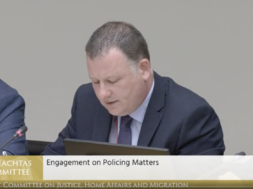Consistent and widespread breaches of policy in the administration of the penalty points system have been uncovered by the Garda Síochána Inspectorate.
In a report into the operation of the Fixed Charge Processing System (FCPS) published this evening the Inspectorate also found that it was bedevilled by waste of money and resources.
A series of 37 recommendations for improving the system in the short, medium and long term were made in the report presented to the Minister for Justice Alan Shatter by Chief Inspector Robert K Olson.
The report is the result of a detailed examination of the penalty points system including the practice of cancellation of fixed charge notices (FCNs).
The Inspectorate found inconsistent and widespread breaches of policy by those charged with administering it and found no meaningful evidence of consistent quality management supervision, no training and no clear policy guidelines on its implementation.
The Inspectorate also found no auditing of the cancellation process of fixed charge notices either at Garda Headquarter, Regional, Divisional and District or at any level that would have identified these problems.
In analysing the cancellation practice, the Chief Inspector expressed concern at the “inconsistent application, interpretation and subjectivity of the cancellation of fixed charge notices which must be addressed.”
He also remarked on the cancellation rates across 110 districts where a significant proportion of cases were cancelled in circumstances that do not satisfy the FCPS policy.
The Inspectorate recommended an overhaul the entire FCPS including the centralisation of the cancelling authority at the Fixed Charge Processing Office in Thurles.
“Correcting the serious deficiencies in the cancellation process through full implementation of the recommendations in this report will bring the FCPS in line with international best practice,” said Chief Inspector Olson.
The report highlights a number of cases where penalty points should not have been cancelled.
One case involved a taxi driver who had five cancellations in ten months. Another case related to a driver who had three notices cancelled on consecutive days because he claimed he was late for work on both occasions.
The Inspectorate also found that the system was “fraught with wasteful use of garda and other stakeholder resources.” It pointed to a lack of management oversight in not implementing the required monitoring mechanisms at operational level, providing training for cancelling authorities and clear policy guidelines for its use.
One area of waste discovered by the Inspectorate was the operation of the eight robot vans used to detect road traffic offences. The report found that the vans were performing the same functions as privately operated safety cameras.
“The initial purchase, fit out and equipment cost for each of the eight robot vans was approximately €100,000 with a total annual maintenance cost in 2012of approximately €51,000 for all eight vans.In essence the garda robot vans provide no more than a supplementary service.”
The report quotes several senior garda officers who lamented “if everyone had just followed the manual we wouldn’t be dealing with this.” It asses that senior gardai had told the Inspectorate “that but for the public scrutiny the extent of the deficiencies within the fixed charge processing system would not have been detected.”
One of the deficiencies identified by the Inspectorate was that convicted offenders are managing to avoid penalty points by the simple ruse of not bringing their driving licence to court.
It cited information provided to the Dail by Mr Shatter which disclosed that while a total of 16,493 offenders were convicted of penalty points offences across all district courts between March 2012 and August 2013 only 40 per cent had their driving licence number recorded.
It recommended that a system be introduced immediately to ensure that all penalty points are endorsed on licences.
Irish Times
by Stephen Collins 13/3/2014









